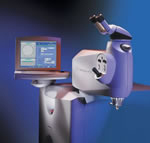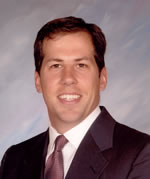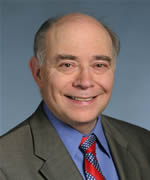-
 All-Laser LASIK is safe, effective, and extremely precise. The technology, developed in 2001, allows for the entire LASIK procedure to be completed by laser, eliminating the blade from the treatment.
All-Laser LASIK is safe, effective, and extremely precise. The technology, developed in 2001, allows for the entire LASIK procedure to be completed by laser, eliminating the blade from the treatment.In All-Laser LASIK, a laser is first used to create a cornea flap, allowing access for a second laser to reshape the central layer of the cornea. The first laser, sometimes referred to as a femtosecond laser, has been a critical step in the evolution of refractive surgery. Nashua Eye surgeons use a femtosecond laser called the Intralase laser. The Intralase creates a cornea flap that is remarkably precise in thickness and shape. Before femtosecond lasers, surgeons were dependent on a "microkeratome", or automated oscillating blade, to create the cornea flap.
All-Laser LASIK has many advantages. The precision of the femtosecond laser allows the surgeon to confidently create a safe, thin cornea flap. Studies show the precise flaps minimize trace amounts of cornea distortion, allowing for excellent quality of vision. Thinner flaps allow patients who were born with thin corneas or large prescriptions to benefit from LASIK. Finally, clinical studies show that patients have fewer dry eye symptoms as the eye is healing from thin flap All-Laser LASIK.
-
Custom LASIK provides a superior quality of vision by tailoring treatments to very unique aspects of an individual's eye. Nashua Eye LASIK surgeons use the Allegretto Eye-Q to reshape the cornea.The laser allows for wavefront optimized treatments which treat not only nearsightedness, farsightedness, and astigmatism, but those distortions that are unique to a patient's eye.These distortions are called higher order aberrations. Custom treatments became available in about 2003, and have given many Nashua Eye patients superior, customized vision.
Custom LASIK reduces visual symptoms such as glare and halos when compared to non-custom treatment, or 'conventional' treatment. For example, patients who have custom LASIK report less glare with oncoming headlights when driving at night, and less halos around streetlights. The quality of vision after custom LASIK is described by researchers as superior "contrast sensitivity". The satisfaction rate in patients who have Custom LASIK is excellent.
-
Timothy D. Blake, M.D.

Education
Yale University, 1996
Medical School
Loyola University, 2000
Internship
Resurrection Hospital, 2001
Residency In Ophthalmology
Temple University Hospital, 2004
Fellowships
Wilmer Eye Institute Johns Hopkins Hospital, Cornea,
Cataract and Refractive Surgery, 2005
Practice of Ophthalmology
2005 to present
American Board Certified
2007John J. Dagianis, M.D.

Education
Darmouth College, 1972
Medical School
University of Cincinnati College of Medicine, 1976
Internship
Albany Medical Center, 1977
Residency In Ophthalmology
Wills Eye Hospital of Thomas Jefferson University, 1980
Practice of Ophthalmology
1980 to present
American Board Certified
1981 -
Q: What are the long-term effects of LASIK?
A: LASIK has been performed in North America and abroad since the mid 1990's. More than 2 million procedures have been performed in the United States. Large university studies show that LASIK is a safe, effective, and durable treatment.
Q: What are the LASIK side effects?
A: The most common side effects of LASIK are temporary symptoms of dry eye and seeing glare or halos under low light conditions. These symptoms normally resolve as the eyes heal. Other complications have been reported, including infection and surgical flap difficulties. While rare, these very unusual problems can typically be treated. Studies show that the risk of rare complications can be reduced even more by choosing an experienced surgeon.
Q: Does LASIK hurt?
A: Patients generally describe LASIK as painless. Some patients describe pressure on and around the eyes during the procedure. Numbing drops are placed so the patient is comfortable and a medication is prescribed by mouth to relax on the day of the procedure. Most patients elect to take this medication for relaxation. Post-operatively, patients may describe scratchiness or dryness which rapidly resolves with healing.
Q: What makes the LASIK experience different at Nashua Eye?
A: Nashua Eye is an established member of the southern New Hampshire medical community, with well-educated, well-trained, and experienced surgeons. Because Nashua Eye provides complete eye care services, the practice is not dependent on doing refractive surgery to be viable. Nashua Eye offers refractive surgery services to enhance the quality of life of patients in our community, and not as a business model. The surgeons at Nashua Eye personally perform the pre-operative consultation, evaluation, and post-operative care.
-
Visit our Website at www.nashuaeye.com
Copyright ©2013 Nashua Eye Associates. All Rights Reserved.
Medical Website design and maintenance by Glacial Multimedia, Inc.
